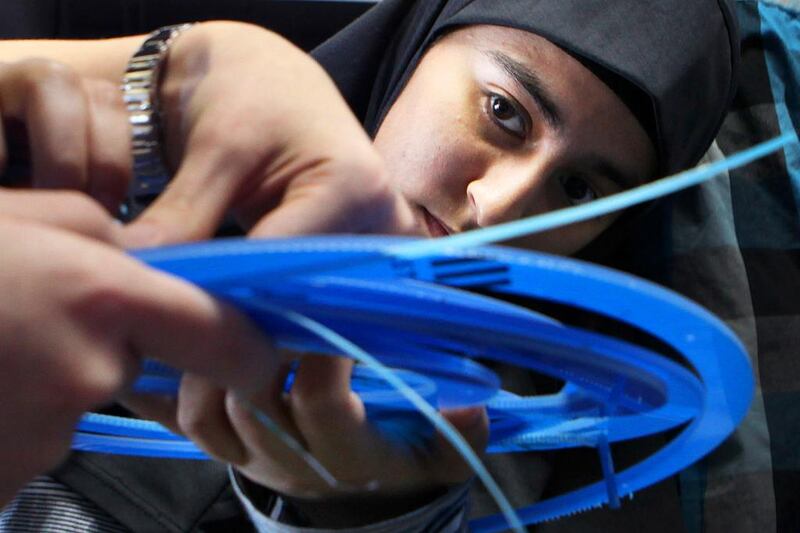All told, the process that two of my former students, Rafael Scharan and Stephen Underwood, have just navigated took about 12 months, right around the average amount of time for a UAE-based SME to get up and running. It was also within the five to 18-month global average.
Perhaps the biggest challenge these two young entrepreneurs had to overcome was funding. No surprise there. But what is especially challenging in the Middle East and North African market is a dearth of mechanisms that link entrepreneurs with traditional and private means of financial support. A recent survey by Emirates NBD offers a glimpse into the situation facing small businesses today: 80 per cent of business owners who were polled admitted using personal savings to finance their business, and only 23 per cent said they had gone to a bank for financing in the past five years.
This is no way to fund a grass roots revolution in ideas.
To level the playing field for small businesses, a complementary approach is needed to support businesses that have already exhausted resources from the government, venture capital firms, the banks and even their owners’ pocketbooks.
Most lending activity to small businesses just starting out in the UAE comes from the public sector and most often in the early stages. Successful government initiatives such as the Mohammed bin Rashid Fund offer young Emirati entrepreneurs access to seed capital up to Dh500,000 and bank loans as high as Dh5 million.
Private equity buyouts and venture capital offerings, however, have been more conservative because of perceived risks in new, often untested business models.
The current approach tends to heavily favour early financing and support for business owners themselves, creating an imbalance that excludes private investors who have come here from every corner of the planet with open minds and bulging chequebooks. Reaching out to this enthusiastic demographic is a strategy that may not only keep viable businesses afloat in the Arabian Gulf but also help to address a knowledge deficit that exists for many investors new to the region.
At NYU Abu Dhabi, we are trying to bridge this gap between entrepreneurs and small business owners and their potential investors. The university recently hosted a symposium of business experts to brainstorm how best to open a global dialogue about these regional challenges. A key theme was identified: a lack of access to capital, particularly at later stages of business growth, continues to dog the start-up ecosystem.
It is an ideal time, during the UAE’s Year of Innovation, to develop a well-rounded entrepreneurial model that unites local ideas with local capital streams. With nearly 400 million consumers, the Middle East and North Africa is increasingly significant as a global market contributor. Both the talent and capital are here to create our own version of Silicon Valley. What’s needed are strategies to link willing investors with entrepreneurs whose ideas support jobs, health, security, clean water, education and the environment.
If done well, enhancing connectivity between investors and entrepreneurs with funders would actually bolster the private angel investing landscape, especially at later stages of business growth. It is also an opportunity for institutions such as NYU Abu Dhabi to become leading advocates of knowledge-sharing and marketplace connections.
There are few regions in the Gulf better situated than the UAE to establish a sustainable start-up model to deliver new products and services to the world’s fastest-growing economies. The country is ideally positioned from a financial and geographic perspective, and the region’s entrepreneurs are mobile, embrace risk and are willing to move to Abu Dhabi to create a commercial hub.
What is needed now are means to encourage them to come and to invest in our ideas.
At the NYU Abu Dhabi Idea Lab, young men and women are learning to develop business and commercialisation strategies for their products and pitch to local investors; Blacksmith Coffee is one example. But these types of initiatives and centres must emerge far beyond our campus on Saadiyat Island.
NYU Abu Dhabi aims to nurture bold ideas and provide entrepreneurial programming for students that will take an idea from paper, to prototype, to the marketplace.
At the same time, we are committed to providing consistent, well-rounded education and networking opportunities for all levels of private investors – from faculty who are coming here from all over the world to established investors.
When investors are well informed of their choice and start-up businesses have access to long-term financing, the end result will be an economic environment in which both can thrive.
Ramesh Jagannathan is the associate dean of engineering and the NYU Abu Dhabi vice provost of innovation and entrepreneurship






